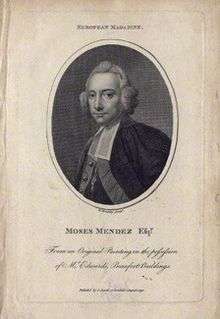Moses Mendez
Moses Mendez, or Mendes, (1690? - 4 February 1758), was a British poet and playwright. It has been suggested that he wrote the anonymous texts for Handel's dramatic English oratorios "Solomon" and "Susanna".[1]

Life and career
Moses Mendez was born to a Jewish family in London. After studies at the University of Oxford he followed his father's choice of career as a stockbroker and became prosperous.[2] Mendez owned an estate called St Andrew’s at Old Buckenham in Norfolk. He wrote numerous poems and stage pieces, including the libretti for ballad operas including "The Double Disappointment" and "The Chaplet", produced at leading London theatres Covent Garden and Drury Lane in the 1740s. [3] He also wrote the text for the 1750 ballad opera "Robin Hood" with music by Charles Burney. It has recently been suggested that Moses Mendes wrote the unattributed texts for Handel's oratorios "Susanna" and "Solomon", both of which had their first performances in 1749.
Mendez was a freemason, having joined the Premier Grand Lodge of England and helped organise their Grand Festival in 1738.[4]
He is mentioned by the writer William Maginn in a paper about English songs. Maginn writes:
Vain, quite vain, the toil you spend is,
When your time in verse you pass;
For, good Mr. Moses Mendes,
You are nothing but ass[5]
Notes
- Andrew Pink. ‘Solomon, Susanna and Moses : locating Handel's anonymous librettist’. Eighteenth Century Music. Volume 12 / Issue 02 (September 2015) pp. 211-222.; accessed 6 April 2016
- Goodwin, Gordon. "Moses Mendes". wikisource. Dictionary of National Biography. 1895-1900, vol 37. Retrieved 29 January 2017.
- Jacobs, Joseph. "Moses Mendes". Jewish Encyclopedia, 1906. Retrieved 29 January 2017.
- "Jews in English Freemasonry". Jewish Communities and Records. 20 April 2015.
- "Notes and Queries, Jan-June, 1908". 1908.